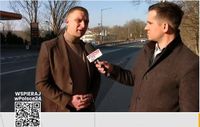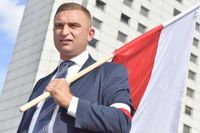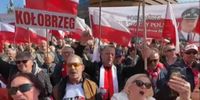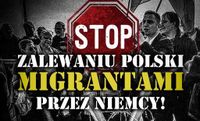On Saturday, March 22, 2025, a significant protest took place on the John Paul II bridge in Zgorzelec, Poland, where thousands gathered to voice their opposition against illegal migrant transfers from Germany. Organized by the Stowarzyszenie Roty Marszu Niepodległości and supported by numerous local clubs from Kluby Gazety Polskiej, the protest centered around the slogan, "Stop zalewaniu Polski migrantami przez Niemcy," signaling intense nationalistic sentiments.
As the gathering commenced at noon, participants showed solidarity and determination to defend Poland's borders against a flow of migrants they perceived as culturally foreign. Among them, Janusz Kowalski, a lawmaker from the ruling party, raised concerns about the identity of a group of masked individuals. "Kim jesteście? Zdejmijcie te maski, tu są polscy patrioci. Czy jesteście prowokatorami?" he questioned, referencing the suspicious appearance of the masked group amid the rally.
Robert Bąkiewicz, the event's main organizer and prominent nationalist figure, echoed Kowalski's fears, arguing that the masked individuals might be provocateurs attempting to discredit the peaceful demonstration. "Prosimy was o zdjęcie masek i pokazanie się normalnie," Bąkiewicz urged, reinforcing the need for transparency at such sensitive gatherings.
The crowd responded with shouts of "Prowokacja! Zdejmij maskę!" reflecting widespread unease about potential infiltration by outsiders. The atmosphere shifted when calls for police assistance emanated from the stage, highlighting the tension arising from the odd presence of masked figures. "Proszę o wyciszenie muzyki! Gdzie jest policja?" rang out as some participants expressed anxiety over the chaotic situation.
Throughout the demonstration, the eloquence of both Bąkiewicz and Kowalski resonated with the assembled patriots. Sławomir Śmigielski, leader of the Wrocław club, proudly acknowledged the attendance of many local clubs, emphasizing a unified front. “Jestem bardzo dumny, że państwo dotarliście w takiej liczbie,” he stated, encouraging more citizens to defend their sovereignty. The meeting was a show of force, claiming to block the border crossing for the first time in two years as they demanded immediate border controls.
Kowalski was vocal about the perceived threat posed by Germany, declaring, "Tu powinno być polskie państwo. Tu powinna stać policja, straż graniczna, polskie wojsko i bronić polskiej granicy." He reiterated the call for action to prevent Germany from transferring migrant, labeling their approach as unacceptable and detrimental to Poland's security.
Moreover, the protest highlighted an ongoing narrative wherein demonstrators characterized Germany as an enemy, actively pushing migrants toward Poland while their own eastern borders remained vulnerable. Bąkiewicz spoke of a 'hybrid war,' stressing that Germany's migrant policies directly jeopardize Polish safety. He declared, "To Niemcy dzisiaj wpychają do Polski migrantów," firmly placing Germany as the target of national grievances.
This intense nationalistic discourse was punctuated with chants of "Nie ma zgody!" and renditions of the Polish patriotic song, “Bogurodzica,” serving to reinforce the emotional undercurrent of the event and the collective identity among participants.
As the rally unfolded, discussions about the implications of such mass protests surfaced, with observers noting that it aligned with similar events denouncing Germany's migration policies, which had also garnered significant media attention. These protests are part of a broader trend of rising nationalism and resistance to foreign immigration policies perceived as threatening to Polish identity.
Robert Bąkiewicz adamantly claimed the situation demanded immediate action. He stated emphatically, "Mamy do czynienia z inwazją! Niemcy masowo dokonują pushbacków. To śmiertelne niebezpieczeństwo dla Państwa Polskiego." His statements energized the crowd, who are increasingly frustrated by their government’s inaction regarding border security. With sentiments running high, protestors left no room for complacency regarding their resolve to protect Poland.
As the day progressed, the atmosphere remained charged with a need for assertiveness and collective action, encapsulating the essence of the event. Bąkiewicz concluded with fervent calls encouraging participants to maintain their fight for a free and independent Poland, urging unity against perceived external threats. The event left an indelible mark on the ongoing discourse surrounding Poland's immigration policy, signifying a pivotal moment that sets the stage for future confrontations over national sovereignty.
The Zgorzelec protest reflects a critical juncture for Polish citizens grappling with the realities of migration and sovereignty. As protests like these amplify fears about national identity and security, they also spotlight the complexities surrounding the broader debate on illegal migration within Europe. The dialogue surrounding these events indicates a growing resolve among ordinary citizens to take matters into their own hands, further igniting the national conversation about the future of Poland.





![Prowokacja na manifestacji w Zgorzelcu! ″Kim jesteście? Zdejmijcie te maski, tu są polscy patrioci″ [WIDEO] | Niezalezna.pl](https://thumbor.evrimagaci.org/j7JXsBqS17yq45FFikuF2CB8PXQ=/200x0/tpg%2Fsources%2F1fb4afd2-96e9-4306-a403-da68647ce5f4.jpeg)
